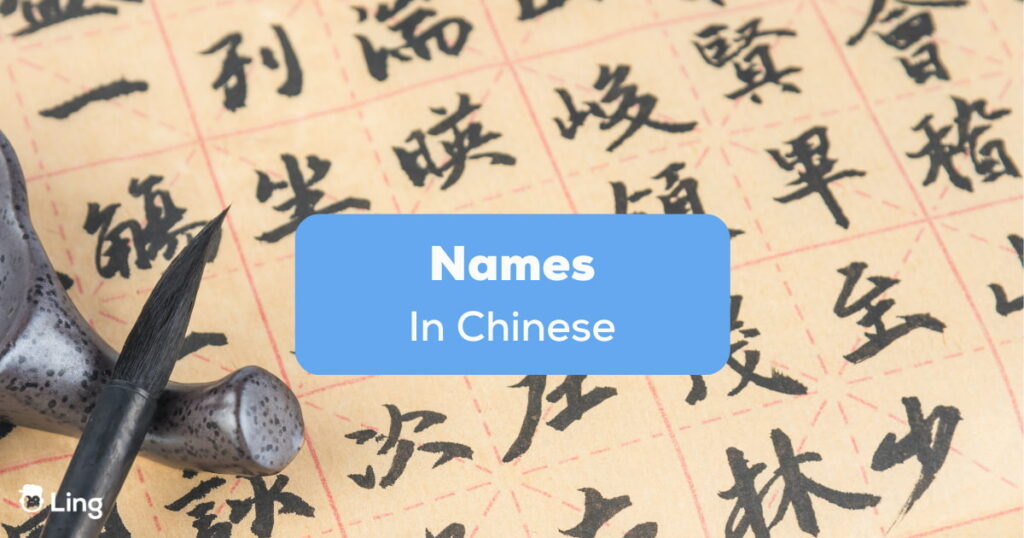Choosing 名字 (pronounced as mingzi) names in Chinese is a great way to immerse yourself in Chinese culture and keep you motivated to study the language. To that point, are you considering getting one? If that is so, read this epic guide!
However, before we dive deep into the sea of beautiful Chinese names, it would be well to familiarize ourselves with some fascinating insights regarding the naming practices of the Chinese people. China has one of the world’s longest-recorded histories. Therefore, it stands to reason that the Chinese people have developed a culture that is genuinely their own. Thus, in Chinese culture, naming conventions may be complex, and how a real Chinese selects a name will undoubtedly be surprising to foreigners. So, let’s take a look at 9 interesting facts regarding names in Chinese culture together!
Cool Facts About Chinese Names
1. Family Name Comes First
Family names are passed down from generation to generation, starting with their parent. Usually consisting of a single word or a single Chinese character, it is used before the given name. According to Chinese naming practices, names are listed in this order;
[Family Name] + [Given Name]
For example, 范冰冰 (Fàn Bīngbīng) and 王一博 (Wáng Yībó).
2. Chinese People Believe Names Can Bring Luck
According to popular belief in China, given names significantly impact one’s fortune, either for the better or the worse. Therefore, parents in China typically choose names for their children that convey happiness and success. Sometimes, parents may consult with a fortune teller to see what name would bring their kid the best fortune based on the time and day of their birth.
3. Chinese Names Often Has An Aspirational Meaning
Numerous Chinese first names provide aspirational meaning. Because each Chinese character has a distinct meaning, parents often use these meanings to form their children’s first names.
4. Chinese Given Names Will Not Be More Than Two Characters
Most Chinese given names, like 巩俐 (Gǒnglì), consist of a single Chinese character or syllable, while 巩 (Gǒng) is the family name. Also, the Chinese name that consists of two characters, like 范冰冰 (Fàn Bīngbīng), are becoming common today. However, you’ll not see a Chinese person’s given name containing more than two characters. In addition, there’s no separating character between the family name and the given name of a person written in Chinese characters.
5. Traditional Chinese Family Members Share The Same Character
The use of generation names is a tool for identifying family relationships. One of the two characters of a typical Chinese given name is commonly used by people of the same generation, such as siblings and cousins. Many children in a large traditional Chinese family will have names with the same generation character. In this example, the generation name is Qīng; hence Wáng Qīngzhào and Wáng Qīnglóng are appropriate. For instance, when you look at Lǐ Zǔyáng and Lǐ Zǔlì, you can see that Zǔ is the generation’s name.
6. Chinese People Consider Names With Homophones
Since most of our interactions are verbal, it’s essential to consider how a speaker’s tone might affect the meaning of a word. For instance, some Chinese parents would not choose the name 树, pronounced as shù, which means a tree, because it sounds similar to 鼠, pronounced as shǔ, which means a rat.
7. Discover A Person’s Birth Year Using Only Their Name.
The decade in which a person was born can also be reflected in their name. For example, a popular choice for the person born in the 1950s and 1960s was Jiànguó, the founding year of the People’s Republic of China.
8. They Create Nicknames With The Word 啊 (Ah)
Anyone who has watched many Chinese films would have heard certain characters refer to one another using titles like Ah lì, Ah Bīng, etc. In addition, family and close friends often use this form to address others, which consists of their surname or the last Chinese character of a person’s given name to follow after the word 啊 (Ah).

Choosing Chinese Baby Names
Common Chinese Baby Girl Names
- 丽 (lì) – pretty
- 花 (huā) – flower
- 爱 (ài) – Love
- 美 (měi) – beauty
- 静 (jìng) – calm/quiet
- 芳 (fāng) – fragrance
- 香 (xiāng) – fragrance
- 秀 (xiù) – elegant/graceful
- 雅 (yǎ) – elegant
Common Chinese Baby Boy Names
- 刚 (gāng) – strong
- 成 (chéng) – success
- 明 (míng) – bright
- 伟 (wěi) – greatness
- 强 (qiáng) – strength
- 豪 (háo) – prosperous
- 富 (fù) – wealth
- 福 (fú) – luck
- 达 (dá) – attainment
- 文 (wén) – literate
- 国(guó) – country
- 超 (chāo) – surpass
Unisex Chinese Names
- 春 (chūn) – spring
- 晨 (chén)– break of the day
- 慧 (huì) – clever
- 江 (jiāng) – river
- 翔 (xiáng) – flying like a bird
- 欢 (huān) – happiness
- 安 (ān) – peace
- 详 (xiáng) – peaceful
- 晶 (jīng) – brightness
- 鑫 (xīn) – wealth
- 新 (xīn) – new
- 明 (míng) – brightness
- 光 (guāng) – glorious
- 平 (píng) – peaceful, stable
- 欢 (huān) – happiness
- 宝 (bǎo) – treasure
- 灵 (líng) – smart
- 可 (xiáng) – able
- 林 (lín) – forest
- 熙 (xī) – happy
Summary
You can see how difficult it is to pick a name in Chinese culture. When choosing a name for a child or other family member, Chinese people carefully consider the name’s meaning and pronunciation. Finally, picking names in Chinese might be difficult for non-Chinese speakers, but it’s also an intriguing cultural practice. The significance they attribute to names and the fact that they believe a person’s destiny can be shaped by the name they’re given further evidence of the persuasive power of the naming ritual. You now have a starting point for thinking about Chinese names that will suit you and impress the locals.
Learn Chinese With The Ling App

Learn some more Chinese now instead of later! Maybe you’re on the lookout for the resources that will help you succeed.
Right after reading this, go download the Ling app. Simply said, we don’t want you to miss out on the best value in language learning by not using Ling. Because it is a user-friendly app, you can study whenever and wherever you please, and most importantly, at your own speed and on your own schedule. The Ling App will help you learn the Chinese language in many different ways, including listening to native speakers, remembering helpful vocabulary, and practicing writing Chinese characters.
Are you ready to start now? So download the Ling App from the Google PlayStore and Apple AppStore now, and prepare to be fluent in Chinese very soon!























